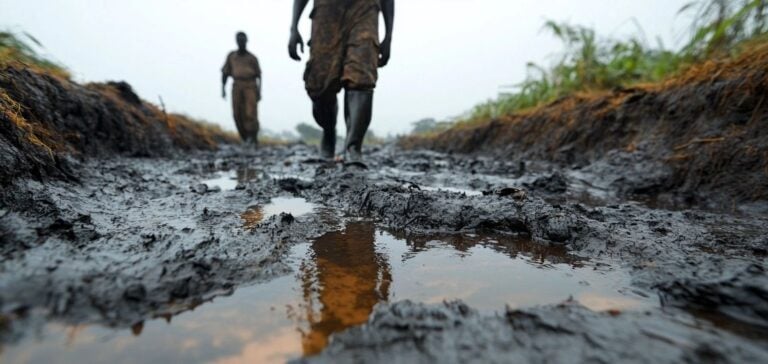For several weeks, an oil spill has been affecting the Buguma drilling site in Rivers State, located in the heart of the oil-rich Niger Delta region in Nigeria. Operated by a subsidiary of the Nigerian National Petroleum Corporation Limited (NNPCL), the incident has been attributed to oil thieves allegedly using explosives to gain illegal access to hydrocarbons.
In a recent statement, Olufemi Soneye, spokesperson for NNPCL, described the incident as an “act of sabotage” that caused fires and prolonged spills. According to the company, crude oil theft on this site has been a recurring issue since March 2023. The criminals’ methods, including the use of dynamite, reflect a troubling escalation in tactics targeting oil infrastructure.
Economic and Environmental Impact
The Niger Delta, the epicenter of Nigeria’s oil production, is frequently the scene of attacks on pipelines and oil facilities. While these acts target economic resources, they have significant environmental consequences. Chima Williams, from the Environmental Defenders Network, called the situation a “catastrophe” for the region. He emphasized that prolonged spills and fires are severely damaging local ecosystems, destroying aquatic and terrestrial habitats.
In 2024, more than 600 oil spill incidents were reported in Nigeria, according to the National Oil Spill Detection and Response Agency (NOSDRA). These spills resulted in the release of approximately 3 million liters of oil, equivalent to 96 tanker trucks, into the environment.
An Oil Sector Under Pressure
Nigeria, Africa’s largest crude oil producer, recently experienced an increase in production following years of decline caused by widespread pipeline theft, attacks, and high operational costs. However, these gains remain fragile amid the insecurity surrounding oil infrastructure.
Companies operating in the country, including NNPCL, also face growing investor skepticism, driven by the frequency of such incidents and associated financial risks. The sabotage at Buguma illustrates the ongoing tension between the economic potential of the oil industry and the structural, security, and environmental challenges it faces.
As the government seeks to stabilize the sector, experts are calling for increased investment in infrastructure security and spill prevention technologies. Proactive management appears essential to restoring investor confidence and minimizing impacts on local populations.






















